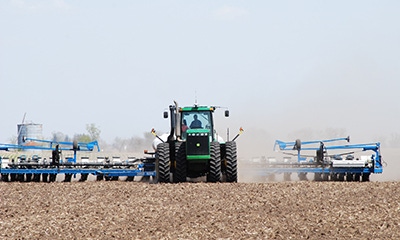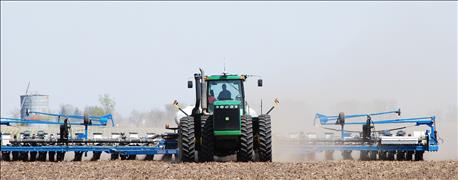January 17, 2016

EDITOR'S NOTE: Steve Johnson is an Iowa State University Extension farm management specialist. Contact him at 515-957-5790 or [email protected].
It's not difficult to see why cash rent negotiation discussions are ongoing this winter. Corn and soybean futures prices are trading near contact lows. Very few bushels were priced ahead for 2016 on last summer's flash rally. Most tenant farmers didn't provide landowners legal notice by September 1 that they planned to terminate their 2016 rental agreement. So now many tenants are looking at the necessity to cut costs in order avoid losing money on cash rented ground.

TOUGH TIMES, TOUGH DECISIONS: Faced with continuing low crop prices in 2016, farmers who are paying high cash rents are trying to renegotiate with their landlords for a lower rental rate. Rather than lose money, some farmers may be tempted to walk away from their rental agreement.
The good news is many farmers had record 2015 corn and soybean yields. While prices per bushel are low, breakeven costs were lower than expected and likely the justification for a tenant to rent the ground another year. Many farmers "bushelled" their way out of 2015 despite paying high cash rents. The odds of being able to do that two years in a row are not good.
Farmers should look closely at their total financial picture, including cash rental rates. For most farmers, the idea is trying to improve the bottom line in 2016 by reducing fixed cost items such as cash rents, machinery and equipment and family living costs. They should use caution in trying to reduce variable costs such as crop inputs that could impact yield.
Keep in mind the landlord's risk considerations
While landlords want roughly a 3% annualized return from their land, in many cases they may depend on that rental income for at least part of their livelihood. Tenants aren't the only ones who need to look at risk factors in rental arrangements. Landlords need to consider the financial health of their tenant. The last thing a landlord wants is to not receive their March or April cash rent payment for 2016.
About 55% of Iowa's farmland is rented, according to the latest survey of Iowa leasing practices compiled by Iowa State University Extension in 2012. About 34% of the state's farmland is cash-rented and 8% of those leases are flexible cash leases. Over one-third of those cash lease contracts call for the entire rent to be paid "upfront" or before spring planting to avoid non-payment or the extreme case of the tenant filing bankruptcy.
~~~PAGE_BREAK_HERE~~~
That is one reason farm legal experts strongly recommend that all Iowa farm leases be in writing and a landlord lien being filed with the Secretary of State's office when a new lease is finalized. If the cash rent is not collected "up front" then the risk of non-payment for that crop year is eliminated. A cash rent landlord who gets into April or May before realizing they have no viable tenant could be scrambling financially.
Flexible cash leases are an option that can work
Modified leases such as a flexible cash leases have been readily adopted in recent years. One example is a cash lease that creates a lower base rent and is collected "up front" before planting.
The potential flexible payment uses gross crop revenue: the farm's actual corn or soybean yields times the simple average of local cash bids for new crop delivery at harvest and uses four dates during the year (Jan. 15, April 15, July 15 and Oct. 15). Subtract the estimated cost of production reflecting a base cash rent (usually $25 to $75 below a typical fixed cash rent average) to determine the net return. Multiply the net return by 33% and that flexible payment can be paid after the yields and prices are known. There are many variations of this type of flexible cash lease contract, but most do not require renegotiation every year.
Communication is key to tenant and landlord relations
Tenants and landlords need to practice good communication skills throughout the year, not just when negotiating cash rental rates. If there is a problem and the tenant wants to renegotiate a lease, he or she should be prepared to provide detailed information such as actual yields and their actual costs of production records to show the need for the change in the rental rate.
Discussion of the rent may include non-monetary items such as conservation and nutrient management practices, or upkeep of buildings, fences, terraces and grassed waterways. Bottom line, the relationship between the tenant and the landlord is still the key to negotiating cash rental rates for 2016.
For farm management information and analysis visit ISU's Ag Decision Maker site extension.iastate.edu/agdm; ISU Extension farm management specialist Steve Johnson's site is at extension.iastate.edu/polk/farm-management.
You May Also Like




